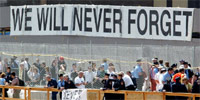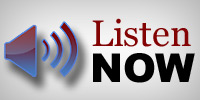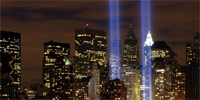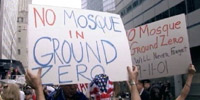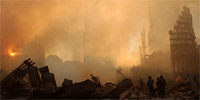Ten years after 9/11, the American public is “like an individual suffering from post-traumatic stress disorder,” writes ethicist Robin Lovin. “We are unable to return to the old world we thought we understood, but we cannot tolerate the noise and uncertainty of the new world, either.” More
“Have we healed? Yes, healed with a hole. It’s never a complete healing, but at least there a willingness to write a new chapter of life,” says Rabbi Joseph Potasnik, a New York Fire Department chaplain. More
“The people who are paying the costs, military families, veterans, civilians in Iraq, Afghanistan, and Pakistan—those people deserve to have their story told,” says Professor Catherine Lutz of Brown University. More
Listen to this week’s show. More
“You’re not tolerant,” says this Christian philosopher, “if you’re indifferent. You’re tolerant if you disapprove of the other person’s religion but put up with it nonetheless.” More
“We think of 9/11 every day,” says Rabbi Joseph Potasnik of Congregation Mount Sinai in Brooklyn Heights. “All you do when it comes to the anniversary, you try to look back and say have I made a difference?” More
College and university students recall 9/11 and reflect on how it affected their spiritual lives. More
The past decade may have brought Americans new interfaith understanding, but it has also expanded interfaith tensions. More
“This decade has been a time of encountering and engaging Islam in a new way that also causes Christians to think about their own identities and understand God and God’s love for people beyond the Christian world,” says Notre Dame history professor Scott Appleby. More
“I don’t believe there is an intrinsic sacredness in any site. We make them sacred in our visits,” says Judaic studies professor James Young, an authority on memorials. More
Religion & Ethics NewsWeekly
X



